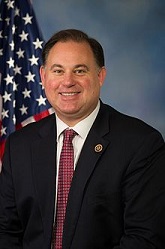 Ignoring a plea from NCUA Chairman Rick Metsger, Rep. Frank Guinta (R-N.H.) introduced legislation Thursday that would require the agency to adopt an 18-month exam cycle for certain credit unions.
Ignoring a plea from NCUA Chairman Rick Metsger, Rep. Frank Guinta (R-N.H.) introduced legislation Thursday that would require the agency to adopt an 18-month exam cycle for certain credit unions.
In a letter to Guinta (pictured) earlier this week, Metsger said he hoped the congressman would hold off on the legislation and allow the NCUA to adjust the exam cycle itself.
To qualify for the 18-month cycle, under Guinta's bill, a credit union must – in general – have less than $1 billion in assets, be well-capitalized and have been found to be well-managed in its last exam. Also, the credit union can't be the subject of a current enforcement action.
The legislation, H.R. 5419, would require the NCUA to issue regulations implementing the requirements within 100 days of its enactment. It would also require the agency to prepare a report on how much money is saved as a result of the extended exam period.
In his letter, Metsger said giving the agency the power to adjust the exam cycle would also give it the flexibility to adjust the cycle during an economic downturn.
“Moving to extend the exam cycle through the regulatory cycle through the regulatory process is the most expeditious way to address this important issue,” he wrote.
He said the NCUA would adjust the exam cycle for certain credit unions within the next two months and is conducting an extensive review of the entire process.
Guinta apparently was not willing to wait, however.
“Credit union employees' time and money could be better spent providing good service to car and home buyers, as well as entrepreneurs, who rely on local credit lines,” Guinta said.
He also said House Financial Services Chairman Jeb Hensarling (R-Texas) has agreed to include Guinta's plan in his proposal to overhaul financial institution regulatory powers, which he plans to introduce in the coming week.
Credit union trade groups praised Guinta's decision to introduce the legislation.
NAFCU Vice President of Legislative Affairs Brad Thaler said, “It is heartening that policymakers in both Congress and at [the] NCUA are moving toward the same goal.”
CUNA Chief Advocacy Officer Ryan Donovan added, “We have confidence right now that we can get to where we need to be with respect to supervisory improvements through the steps [the] NCUA has indicated it is taking, but it is nice to know that if things get off track, we have friends in Congress ready to step in and help.”
© 2025 ALM Global, LLC, All Rights Reserved. Request academic re-use from www.copyright.com. All other uses, submit a request to [email protected]. For more information visit Asset & Logo Licensing.







